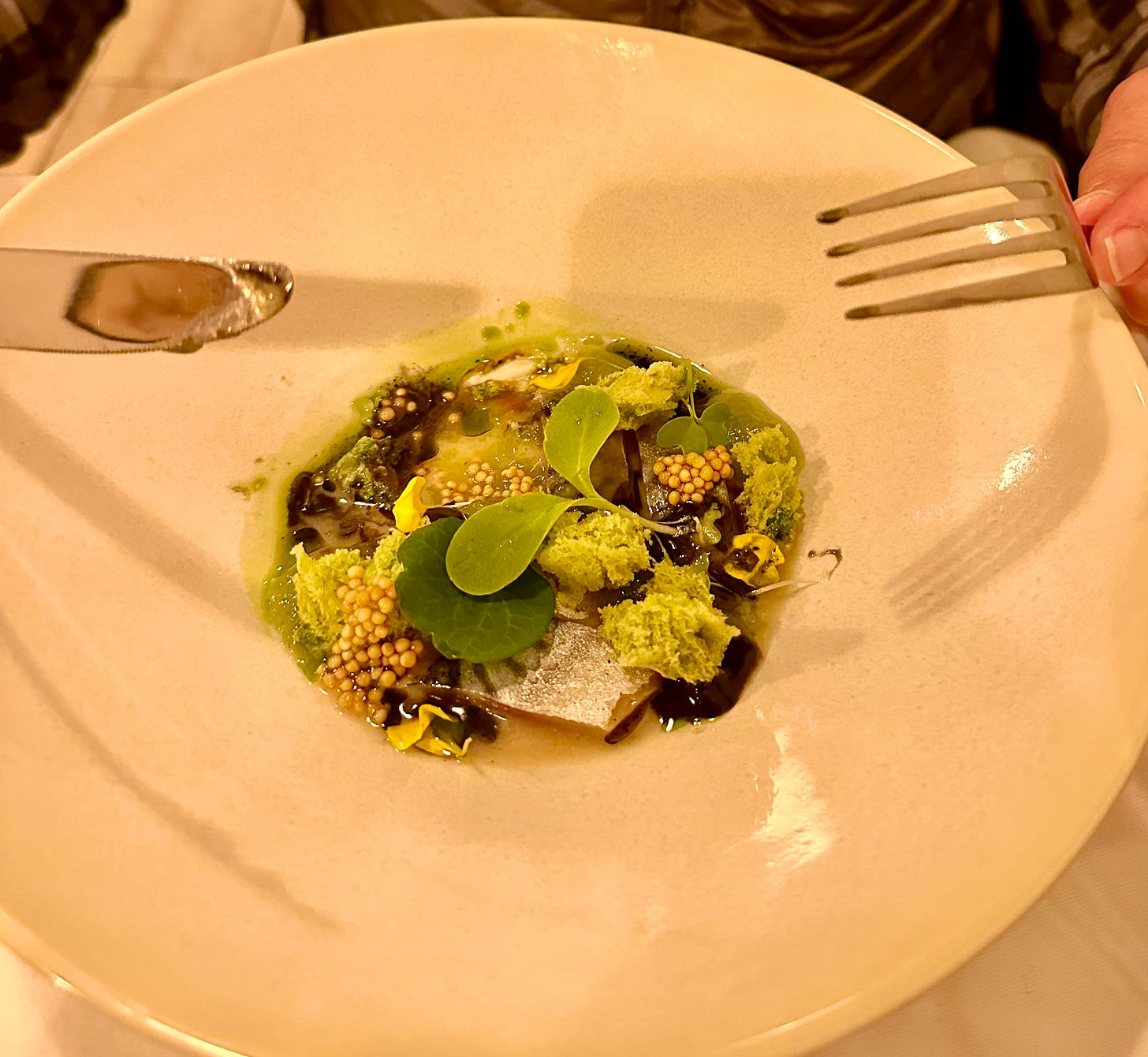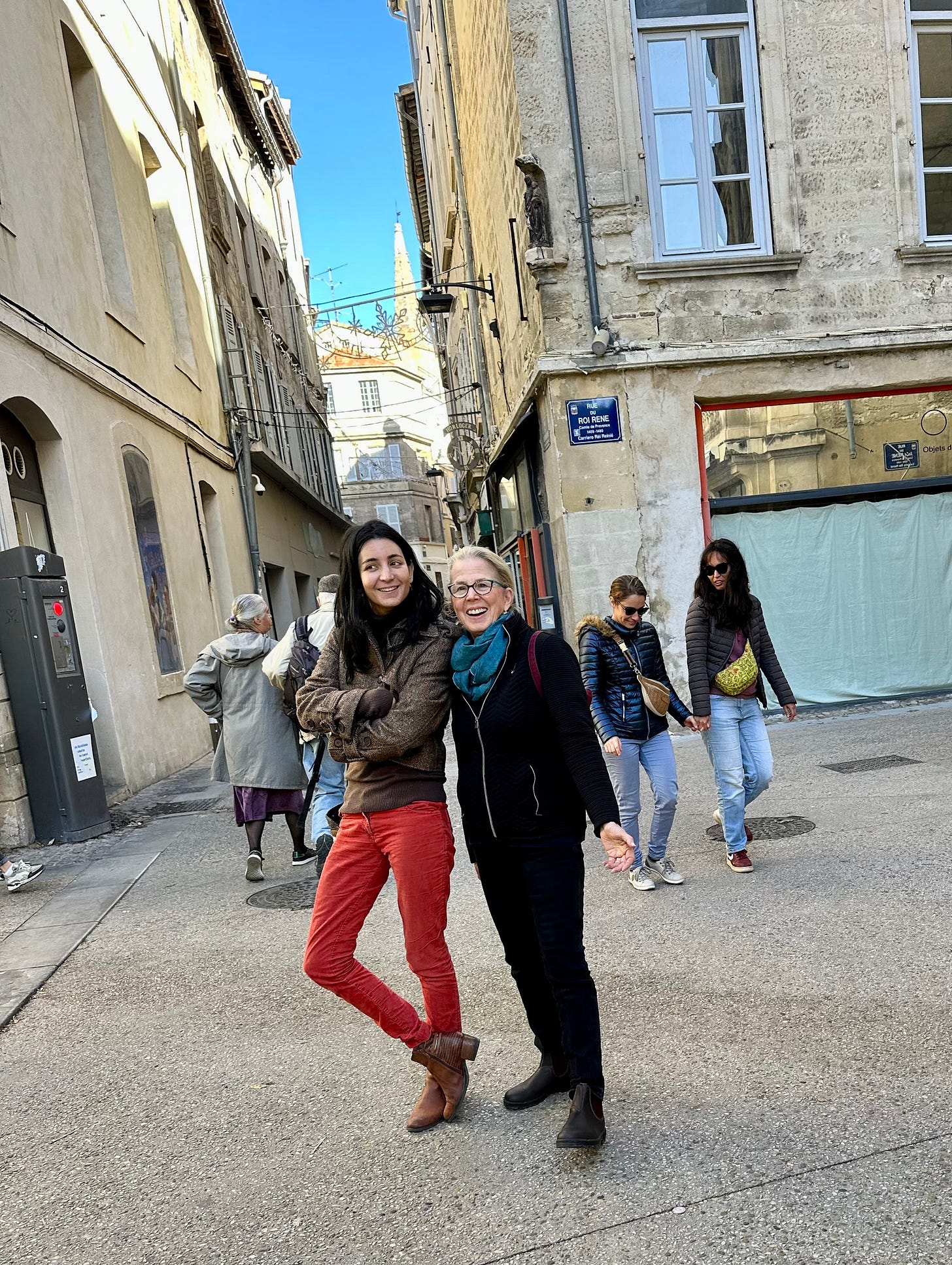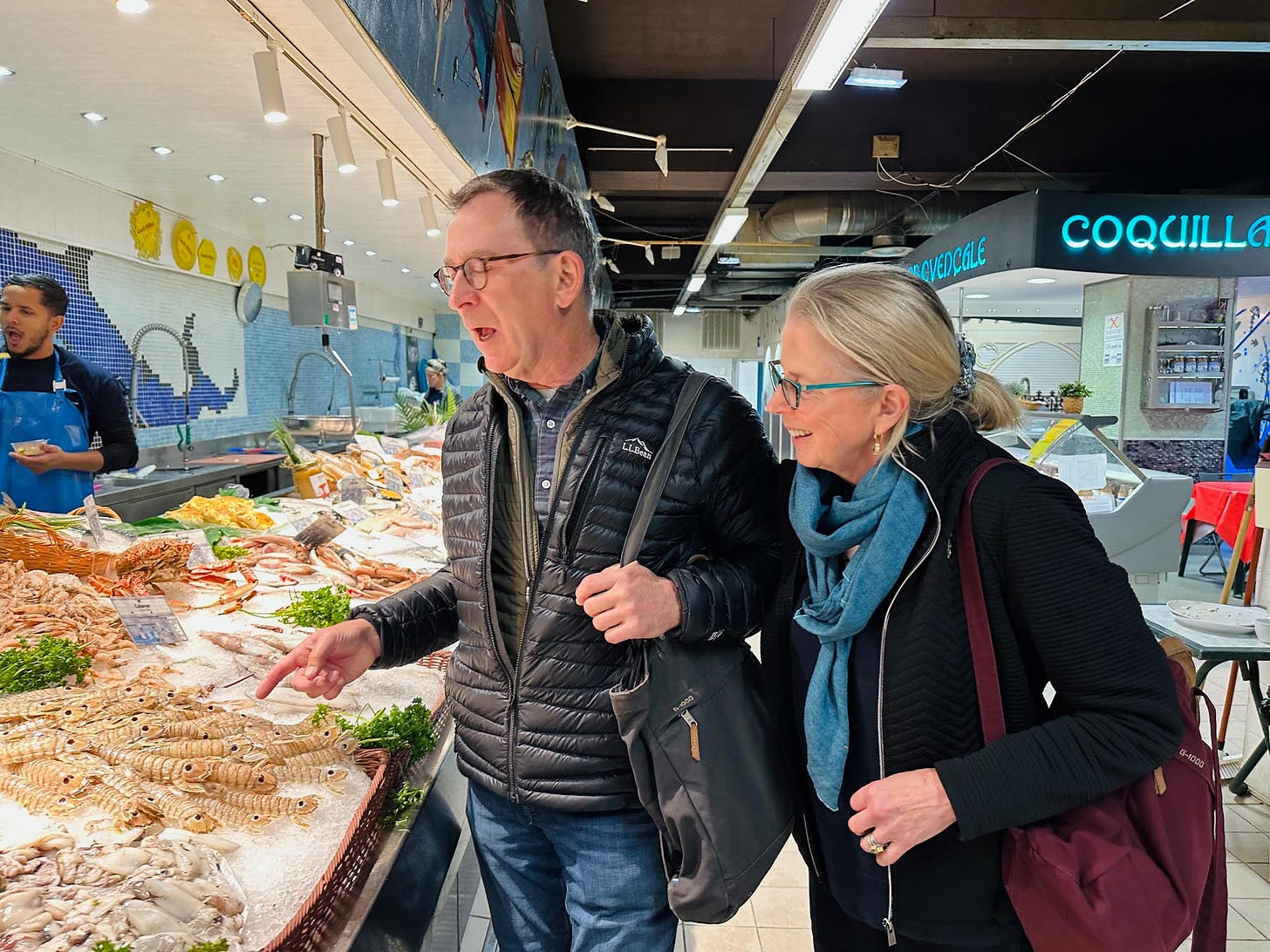Can you become fluent in French in your 70s?
Down the rabbit hole with “Alice” as Debbie and Sam [b]oldly attempt fluency in their eighth decade
It was our first night in Avignon. From the street, the tiny restaurant looked inviting. The interior was brightly lit but empty, with two neat rows of white tablecloths visible. Even the name was appealing: Alice & Ses Merveilles (a play on Alice in Wonderland). We could see a woman, perhaps Alice herself, standing in the back folding napkins. The restaurant’s menu, emblazoned with a yellow Gault & Millau award for 2022-2023, was displayed on a large lit-up stand by the door.
My husband Sam and I had stumbled upon this restaurant while wandering the charming, pedestrian-free streets, looking for a good dinner to kick off our week-long stay. Except it was not yet 7 pm, the magical hour at which all restaurants in France seem to open. (Of course you should not eat until 8 pm.) We were too hungry to wait, so we continued our search, vowing to come back to Alice & Ses Merveilles the following night.
When we did, we learned that “Alice” was indeed the proprietor but her name is not really Alice. No matter, Alice was welcoming and—our number one requirement when dining out and interacting with locals—she was willing to speak French with us. It was here that the comedy of errors began.
“Would you like to sit outside?” she suggested, looking perfectly serious as Sam and I paused, unzipping our heavy jackets to blink at each other. Alice let out an awkward laugh and immediately explained (in French) that it was a joke, “a bad joke!” she added. Once seated (inside), she brought us menus and we immediately realized that we hadn’t paid close enough attention. Oops, rather than multiple dishes there were only four items available: two appetizers and two main dishes, all with long confusing descriptions we could barely read, despite understanding French quite well.
And now from Sam…
Although there were only two options for each course, the descriptions of the food were enough to fill the large menu outside. Then, when the plates arrived, the food had gone cold by the time Alice carefully explained each ingredient, pointing a tad too close with her finger.
I started with the mackerel course. It proved to be four small fillets of mackerel, radiating out from the center of a shallow bowl. Between the fillets were squirts of a mousse-like fruit. A thick soupy sauce had been added on top and a second sauce swirled into this; think of the decorative foam on top of your cappuccino.
Overlaying everything was a small clump of green leafy vegetables and this was decorated with nuts, seeds, and flower petals. Everything was placed just so, perhaps with tweezers, and it was hard to decide if each ingredient should be eaten separately in this deconstructed production, or if it was on me to blend them together with variable results.
The confusion, the strange details, the bright colors, and even the awkwardness of the proprietor (her laugh, her odd gait and mannerisms), made me think we were going down the rabbit hole with Alice…
Back to Debbie…
Now that Sam has made me laugh with an (accurate) description of his appetizer, I will move on from “Alice’s Restaurant” (à la Arlo Guthrie). Let me stress that Alice & Ses Merveilles is a very good restaurant (no doubt worthy of its award)—but too fancy for us. We may have traveled to France, but we’re not the types to enjoy artfully displayed “tweezer food.” What we do love is continuing to improve our conversational French.
Both Sam and I spent time living in France in our teenage years (and studied French in high school and/or college) so we have a good foundation and speak reasonably well. But translating that into fluency is an elusive goal—and about as complicated as our aforementioned dinner menu.
Another French “séjour linguistique” in Avignon
To that end, we’ve done three French “immersion courses” over the past decade. This one in Avignon is the fourth. In France, it’s called un séjour linguistique, meaning the student(s) live in the professor’s home for a week, speaking French all day long whilst being gently corrected and instructed. In addition, the prof cooks for you, making simple but delicious typically French meals, goes with you on nearby excursions and elucidates for you the (continuing) mysteries of French language and culture.
If improving your French is a goal, this may be the most enjoyable and effective way to do it.
Especially if you’re able to hire a professor like Julie Gaudin, a lovely and extremely intelligent 33-year-old woman whom we were lucky enough to study with in 2019. We had hoped to go back the following year but the pandemic interrupted our plans. So here we are in November, hanging out with Julie again.
Late fall may not be the best time of year to visit Provence, but Julie’s language course is in such high demand this was the only week we could book with her in 2023.
Back to Sam
The mechanics of working with Julie are slightly different and more comfortable than the weeks of immersion that we have enjoyed elsewhere in France. First, the small city of Avignon is perfect. The old section is a maze of narrow pedestrian-only streets lined with centuries-old buildings full of shops and restaurants. It’s an inexhaustible source of pleasure to wander. Second, rather than putting us up in a spare room in her own home, Julie supplies her students with their own, spacious apartment which allows for privacy and rejuvenation.
Studying with Julie is a rare combination of pleasure and pain. Of course, it is mostly pleasure, but when she brings out her flashcards and the very small section of my brain devoted to French freezes, the pain is intense, until she breaks the silence with a gentle smile and an admonition to “breathe.”
Although Debbie and I could spend a second lifetime conjugating verbs, as we last did in high school (not a euphemism), Julie wants to focus us more colloquially. One of her lessons includes the strict rules for ordering in a restaurant. If one asks (in French) for a dish with the American construction, “I want to have the fish,” the server is instantly on guard, recognizing that they are dealing with another misguided tourist. Indeed, it is considered rude and abrupt to say or suggest “I want… “ in a restaurant. But if one uses the French construction “je vais prendre” (I am going to take the fish), everything moves smoothly.
Back to Debbie
These may sound like tiny conversational details but they are what constitute fluency. We’ve also been working on elision in pronunciation. For example, if you want to say “Je ne sais pas” (I don’t know) in French, you do NOT say it like that. First, you drop the “ne,” so you say “Je sais pas.” Then you run it together. It should sound like this: “Shay pas.”
Got it? If you don’t, don’t worry. We’re still trying to master this after years of studying. And now that we’re in our 70s, it seems harder than ever to acquire the intricacies of a foreign language.
But like Alice falling down the rabbit hole, French culture and the French language are still fascinating, alluring, and downright wondrous to us.
Still, as our week in Avignon draws to a close, I am eager to take the train back to Paris. We’ve arranged several meals with French friends and although they speak English we’ll be doing our best to speak en français after our course with Julie.
Subscribing to my newsletter means you’ll be the first to know when I publish something new. You can choose to be a free or paid subscriber — I’ll be very grateful either way.
![[B]OLD AGE with Debbie Weil](https://substackcdn.com/image/fetch/$s_!i8Z0!,w_80,h_80,c_fill,f_auto,q_auto:good,fl_progressive:steep,g_auto/https%3A%2F%2Fsubstack-post-media.s3.amazonaws.com%2Fpublic%2Fimages%2Fdaaca764-d8d6-4a1b-bf58-61dbb72810fc_842x842.png)
![[B]OLD AGE with Debbie Weil](https://substackcdn.com/image/fetch/$s_!fEcd!,e_trim:10:white/e_trim:10:transparent/h_72,c_limit,f_auto,q_auto:good,fl_progressive:steep/https%3A%2F%2Fsubstack-post-media.s3.amazonaws.com%2Fpublic%2Fimages%2F95ad4442-e435-4ebc-a8d2-9c9b89a8bdb6_2100x400.png)

![[B]OLD AGE with Debbie Weil](https://substackcdn.com/image/fetch/$s_!i8Z0!,w_36,h_36,c_fill,f_auto,q_auto:good,fl_progressive:steep,g_auto/https%3A%2F%2Fsubstack-post-media.s3.amazonaws.com%2Fpublic%2Fimages%2Fdaaca764-d8d6-4a1b-bf58-61dbb72810fc_842x842.png)







If you want to converse to practice your French without going so far, come visit Quebec City. You will be inspired by the European style of the city. My husband and I will be happy to take you to a restaurant where they don't serve food with tweezers!